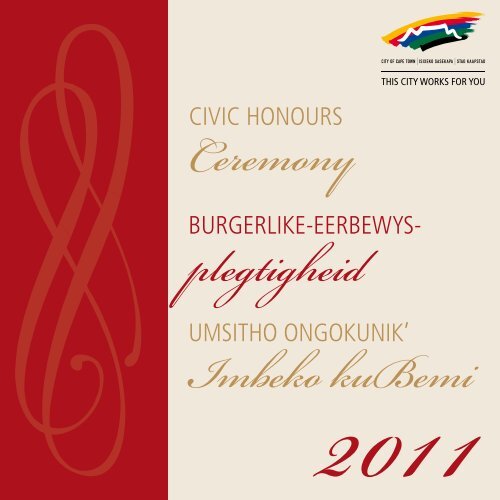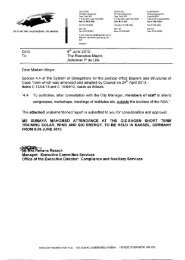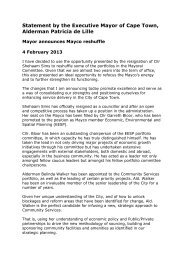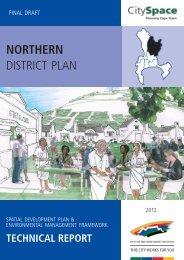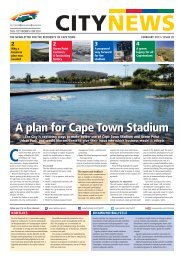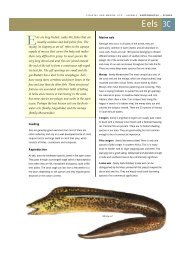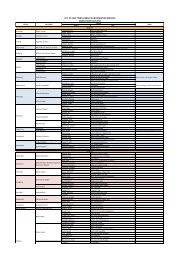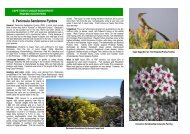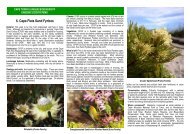Civic_Honours_2011 book SMALL.pdf - City of Cape Town
Civic_Honours_2011 book SMALL.pdf - City of Cape Town
Civic_Honours_2011 book SMALL.pdf - City of Cape Town
Create successful ePaper yourself
Turn your PDF publications into a flip-book with our unique Google optimized e-Paper software.
CIVIC HONOURS<br />
Ceremony<br />
BURGERLIKE-EERBEWYS-<br />
plegtigheid<br />
UMSITHO ONGOKUNIK’<br />
Imbeko<br />
<strong>2011</strong><br />
kuBemi
<strong>Civic</strong> <strong>Honours</strong><br />
Ceremony & Luncheon<br />
COUNCIL CHAMBER, 28 APRIL <strong>2011</strong><br />
Burgerlike-eerbewysplegtigheid<br />
& Middagete<br />
RAADSAAL, 28 APRIL <strong>2011</strong><br />
Umsitho Ongokunik ‘Imbeko<br />
kuBemi & i-Luncheon<br />
I-COUNCIL CHAMBER, 28 EPRELI <strong>2011</strong>
Foreword<br />
Foreword by the Executive Mayor<br />
<strong>Cape</strong> <strong>Town</strong> has a tradition dating back many decades <strong>of</strong> recognising the outstanding contributions <strong>of</strong> its<br />
citizens in various fields.<br />
In recent years the <strong>City</strong> <strong>of</strong> <strong>Cape</strong> <strong>Town</strong> has worked to fully restore and expand the tradition <strong>of</strong> civic<br />
honours in this city.<br />
Why? We know that these values have proven fundamental to the success <strong>of</strong> most great democracies<br />
in the world today. And, like <strong>Cape</strong> <strong>Town</strong>, many major cities around the world bestow civic honours.<br />
As we build our new democracy, we must do all we can to promote the values <strong>of</strong> civic-mindedness. We<br />
need to support the contributions <strong>of</strong> individuals to their communities in every corner <strong>of</strong> our city. These<br />
are the things that will achieve real, lasting development in this place we call home.<br />
We are here today to acknowledge individuals and organisations who have contributed to our collective<br />
development in many different ways, and to encourage them to continue their outstanding efforts.<br />
I would like to thank them for their work, and to congratulate them collectively for being an inspiration<br />
and example to all the people <strong>of</strong> <strong>Cape</strong> <strong>Town</strong>.<br />
DAN PLATO<br />
EXECUTIVE MAYOR OF THE CITY OF CAPE TOWN
Voorwoord<br />
Vandag oorhandig ons hier eerbewyse op die gebied van sport, leierskap, gemeenskapsdiens en uitsonderlike<br />
karakter.<br />
Ons ken ook die eretitel van Raadsheer toe aan Raadslede vir lang en bekwame diens aan die<br />
Stad Kaapstad.<br />
Vandag se gebeurtenis is ter erkenning van die prestasies behaal deur individue in ons gemeenskap.<br />
Ons het almal ‘n leidende rol te speel om ‘n verandering te bewerkstellig en ek daag ander uit om in<br />
hulle voetspore the volg.<br />
Hierdie erkenning vir uitnemendheid word verleen as ‘n blyk van waardering en gelukwensing aan al die<br />
ontvangers vir hul toewyding en prestasies.<br />
Ons dank u met trots.<br />
RAADSHEER DIRK SMIT<br />
SPEAKER VAN DIE STAD KAAPSTAD<br />
Voorwoord deur die Speaker
Signing <strong>of</strong> the<br />
<strong>Civic</strong> <strong>Honours</strong> Book
David Kramer<br />
David Kramer is an icon <strong>of</strong> South African music, and one <strong>of</strong> this country’s most recognised and<br />
successful songwriters and performers. He is also a multi-award-winning playwright and theatre director.<br />
David is credited with pioneering the combined use <strong>of</strong> <strong>Cape</strong> Afrikaans and South African English in his<br />
lyrics. He draws on humour and satire to deliver more serious messages through songs inspired by real<br />
life – with the help <strong>of</strong> his trademark red “velskoene”, a bicycle and a guitar.<br />
David’s musical education began as a child as he listened to the farm workers sing and play guitar near<br />
his father’s furniture shop in Worcester, the town <strong>of</strong> his birth in 1951.<br />
After completing his education at Worcester Boys High School and the Hugo Naudé Art Centre, David<br />
was awarded a bursary to study at Leeds University in the United Kingdom. He graduated with a BA<br />
(Hons) in textile design in 1974 and worked in the industry for 10 years.<br />
His musical career began in the ’70s, which also marked his introduction to Taliep Petersen and their<br />
collaboration on a string <strong>of</strong> stage musical hits starting with District Six (1986). They wrote six musicals<br />
together, focusing on the retelling <strong>of</strong> a suppressed history <strong>of</strong> the <strong>Cape</strong>.<br />
“Kat and the Kings” achieved international success, playing on Broadway and the West End. It received<br />
the Laurence Olivier Award for Best New Musical in London in 1999.<br />
David’s passion for people and the preservation <strong>of</strong> their cultural heritage engendered albums like<br />
“Bakgat” (1981), most <strong>of</strong> which were banned by the South African Broadcasting Corporation. Album<br />
sales nevertheless delivered one platinum and 11 gold records. His songs “Hak Hom Blokkies”, “Die<br />
Royal Hotel” and “Stoksielalleen”, were firm favourites but it was the success <strong>of</strong> “Hak Hom Blokkies”<br />
on the Springbok Radio Hit Parade that prompted David to go into the music industry full-time.
In 2001 David staged “Karoo Kitaar Blues”. It showcased the talents <strong>of</strong> eccentric guitar and violin<br />
players from the Karoo and Namaqualand in theatres all over South Africa and was documented in an<br />
award-winning video.<br />
Five years later David and Taliep staged “Ghoema” in South Africa and London. The research for this<br />
musical has been continued in his most recent work, “Breyani”, which explores the traditional music <strong>of</strong><br />
the <strong>Cape</strong> and provides a platform for showcasing outstanding local musicians.<br />
David is the only South African writer to have a production (“Kat and the Kings”) staged in the West<br />
End and on Broadway. In addition, “Ballade van Koos Sas”, which premiered at the “Suidoosterfees” in<br />
2008, is the first and only Afrikaans musical to have been staged in London in Afrikaans.<br />
His most recent accolade is the “Klein Karoo Nasionale Kunstefees” (KKNK) Kanna Award for<br />
Exceptional Contribution to a Contemporary Music Production, for one specially created for the<br />
“Suidoosterfees” in 2009.<br />
Twenty-two music albums, nine musicals and 17 awards are the product <strong>of</strong> David’s 30-year exploration<br />
<strong>of</strong> a South African identity. He is an inspiration to young artists – a living legend who is dignified and<br />
humble, quiet and confident, talented and witty – never without his black hat. He is married, with two<br />
daughters.<br />
For enriching the musical culture <strong>of</strong> South Africa, the <strong>City</strong> <strong>of</strong> <strong>Cape</strong> <strong>Town</strong> confers <strong>Civic</strong> <strong>Honours</strong> on<br />
David Kramer.<br />
He draws on humour and satire to deliver more<br />
serious messages through songs inspired by real life.
Adam Small<br />
Adam Small is treasured for his mostly Afrikaans works that highlight the lives and oppression <strong>of</strong> the<br />
working class under the apartheid regime.<br />
Born in Wellington in the Western <strong>Cape</strong> on 21 December 1936, Adam was raised on a farm in Goree,<br />
outside Robertson, where his father was the school principal, community leader and lay preacher to the<br />
farm labourers.<br />
Adam was exposed to the faith <strong>of</strong> the Dutch Reformed Church and Islam through paternal and maternal<br />
influences. This taught him cultural and religious tolerance. His family moved to Retreat on the <strong>Cape</strong><br />
Flats where Adam discovered the Kaaps vernacular that characterises his writing.<br />
After attending several Catholic schools and matriculating in 1953, he obtained a degree in languages<br />
and philosophy and an MA cum laude on the philosophy <strong>of</strong> Nicolai Hartmann and Friedrich Nietzsche at<br />
the University <strong>of</strong> <strong>Cape</strong> <strong>Town</strong>. He was appointed lecturer in philosophy at the University <strong>of</strong> Fort Hare in<br />
1959 and at the University <strong>of</strong> the Western <strong>Cape</strong> (UWC) in 1960. He was also a past pr<strong>of</strong>essor <strong>of</strong> English<br />
literature at the latter institution.<br />
His activism and involvement with the Black Consciousness Movement forced him to move to<br />
Johannesburg for some years, before returning to <strong>Cape</strong> <strong>Town</strong> in 1977. In 1983 he rejoined UWC as<br />
head <strong>of</strong> the department <strong>of</strong> social work, where he retired in 1997.<br />
Adam’s first published collection <strong>of</strong> poetry was “Verse van die Liefde” (1957). This was followed by<br />
“Klein Simbool” (1958). In his poetry collections “Kitaar My Kruis” (1961) and “Sê Sjibbolet” (1963) he<br />
criticises apartheid policies and racial discrimination. The theme is echoed in his long essay “Die Eerste<br />
Steen”, which looks at the influence <strong>of</strong> apartheid on race relations.
In “Kô Lat Ons Sing” it is evident that he uses his writing as a weapon in the struggle to free his people.<br />
“Oos Wes Tuis Bes Distrik Ses” (1973) is a <strong>book</strong> <strong>of</strong> poems that pays homage to the lives affected by the<br />
forced removal <strong>of</strong> the entire District Six community.<br />
“Kanna Hy Kô Hystoe” (1965) is his landmark Afrikaans drama, praised by critics for its use <strong>of</strong> the<br />
Brechtian epic theatre and the way it experimented with music, decor and time. Adam’s protagonist is<br />
torn between his ambitions and meeting the expectations <strong>of</strong> his people. The play highlights the politics<br />
that imprisons people in despair and explores responsibility for one’s actions.<br />
The work preceded plays like “Joanie Galant-hulle” (1978), which relates a family’s exposure to the<br />
gang violence and poverty <strong>of</strong> the <strong>Cape</strong> Flats after being forced to move from Woodstock.<br />
In the novel “Heidesee” (1979) Adam looks at the effect <strong>of</strong> apartheid and a capitalistic economy on a<br />
small fishing community, while “Krismis van Map Jacobs” (1983) investigates a search for identity as<br />
the protagonist deals with the guilt <strong>of</strong> being partly responsible for a violent act committed against<br />
his family.<br />
Other work includes A Brown Afrikaner Speaks: A Coloured Poet and Philosopher Looks Ahead (1971);<br />
Black Bronze Beautiful (1975), a series <strong>of</strong> lyrical verses that demonstrate pride in black history and<br />
culture; Oh Wide and Sad Land: Afrikaans poetry <strong>of</strong> NP van Wyk Louw (1975), translated into English by<br />
Adam, and District Six (1986, with photographer Chris Jansen).<br />
For his everlasting contribution to Afrikaans literature, the <strong>City</strong> <strong>of</strong> <strong>Cape</strong> <strong>Town</strong> confers <strong>Civic</strong> <strong>Honours</strong> on<br />
Adam Small.<br />
“Kanna Hy Kô Hystoe” is his landmark<br />
Afrikaans drama, praised by critics for its use<br />
<strong>of</strong> the Brechtian epic theatre and the way it<br />
experimented with music, decor and time.
Phyllis Bernice Sp<br />
Throughout her career, Phyllis Bernice Spira was hailed for her beauty, wealth <strong>of</strong> expression, elegance <strong>of</strong><br />
line, and the kind <strong>of</strong> magic that captures an audience’s attention and gives them joy.<br />
Phyllis was born in 1943 and began her ballet training at age four. She attended Waverley Girls High<br />
School in Johannesburg and was accepted into the Royal Ballet School at age 16.<br />
She later joining the Royal Ballet Touring Company and danced as a soloist in Europe, the Middle East<br />
and the Far East. However, she turned down an international career and an invitation to dance with the<br />
legendary Rudolf Nureyev to return to South Africa in 1964.<br />
Phyllis joined the former Performing Arts Council <strong>of</strong> the Transvaal (PACT) Ballet Company and a year<br />
later joined the <strong>Cape</strong> Performing Arts Board (CAPAB) where, over almost three decades, her artistic<br />
standards helped raise the company to an international level. She toured with the National Ballet <strong>of</strong><br />
Canada from 1967 to 1968.<br />
Being a great ballerina goes far beyond technique and encompasses more than personal magnetism,<br />
range <strong>of</strong> expression and musicality (yet Phyllis had a knack <strong>of</strong> really sinking into the music and floating<br />
through her movements). She was the ideal frail Giselle, a powerful Odile in Swan Lake, an extraordinary<br />
Juliet, and the epitome <strong>of</strong> innocence and grace in The Sleeping Beauty. Her superb role in La Sylphide<br />
displayed the true sense <strong>of</strong> the Romantic ballerina.<br />
Her talent was embraced with her ability to work hard; her sure technique and unmistakable<br />
classical line standing her in good stead through times <strong>of</strong> triumph as well as injury and recovery, the<br />
occupational hazards facing a pr<strong>of</strong>essional dancer.<br />
Phyllis was granted the status <strong>of</strong> prima ballerina assoluta, a title held by only a few dancers worldwide,<br />
in 1984.
ira<br />
She retired from performance in 1988 after an opening night injury in Giselle, but continued to teach<br />
and coach dancers as principal ballet mistress with CAPAB until 1999. She was dedicated to work and<br />
art but would not hesitate to find out a cricket score or talk about rugby in breaks during rehearsals.<br />
Phyllis was unselfish in sharing her own disciplined standards during her time as ballet mistress, but also<br />
demanding <strong>of</strong> the company in its pursuit <strong>of</strong> excellence.<br />
Her most successful partnerships were with Gary Burne and particularly Eduard Greyling, who liked to<br />
show his ballerina at her best. Phyllis blossomed in that partnership.<br />
Her legacy lives on not only in her fans’ memories but also through Dance for All, a non-pr<strong>of</strong>it<br />
Section 21 company established by her and her husband, Philip Boyd, to train dancers in <strong>Cape</strong> <strong>Town</strong>’s<br />
townships. She headed the Dance for All senior training programme and was assistant artistic director <strong>of</strong><br />
the Youth Company, formed in 2005.<br />
Among her many accolades, Phyllis received South Africa’s highest civilian award for excellence,<br />
the Order <strong>of</strong> Meritorious Service Gold (1991), and won the Nederburg Award for Ballet twice. She<br />
also received the Lilian Solomon Award and the Bellarte Woman <strong>of</strong> the Year Award for the <strong>Cape</strong><br />
(1979). Phyllis was presented with the Order <strong>of</strong> the Disa (2003) for her contribution to ballet and the<br />
development <strong>of</strong> ballet in disadvantaged communities and received the Lifetime Achievement Award<br />
from the Department <strong>of</strong> Cultural Affairs and Sport (2004) for her contribution to ballet in South Africa.<br />
She passed away suddenly, aged 64, in <strong>Cape</strong> <strong>Town</strong> in 2008.<br />
For her extraordinary dedication to her work and her art, her artistic achievements, and her contribution<br />
to the development <strong>of</strong> dance in South Africa, the <strong>City</strong> <strong>of</strong> <strong>Cape</strong> <strong>Town</strong> confers <strong>Civic</strong> <strong>Honours</strong> on<br />
Phyllis Bernice Spira.<br />
Phyllis was granted the status <strong>of</strong> prima ballerina assoluta,<br />
a title held by only a few dancers worldwide, in 1984.
Leonora van den H<br />
Leonora van den Heever holds the esteemed position <strong>of</strong> being the first female judge to be appointed<br />
permanently to the appellate division <strong>of</strong> the South African Supreme Court in 1991.<br />
She was born in Windhoek on 9 July 1926 to FP (“Toon”) van den Heever and Margaretha (“Max”)<br />
Rautenbach, and attended school in Bloemfontein.<br />
A love <strong>of</strong> languages, which she inherited from her father, led her to complete a BA degree, majoring in<br />
English and Latin, and a Master’s in English at the University <strong>of</strong> Pretoria.<br />
She taught and lectured school children and college students respectively, until her father, who had<br />
been appointed to the bench, asked her to fill in as his registrar. Two weeks later, Toon was given an<br />
acting appointment in the appellate division and the senior counsel who replaced him “inherited”<br />
Leonora. They were sent out on Circuit for three months and Leonora decided to study for her LLB parttime<br />
through the University <strong>of</strong> the Free State.<br />
The day after her graduation in 1952 she was admitted to the Orange Free State bar. She was also<br />
admitted in Lesotho in 1953, and later Griqualand West, South West Africa, and what was then Natal<br />
and Transvaal.<br />
Leonora earned some extra pocket money writing short stories under a nom de plume for “Sarie” and<br />
published two children’s <strong>book</strong>lets under her own name. As her practice grew, the writing dwindled.<br />
She married Christo Neethling in June 1958. He was transferred to Welkom almost immediately, but<br />
it worked in Leonora’s favour. She was granted leave from the Bar Council to practice from home,<br />
spending time with her three daughters by day and working at night.<br />
Attorneys in this developing area soon realised they had an advocate available almost 100 miles closer<br />
than those in Bloemfontein, and Leonora was briefed for trials in the magistrates’ courts in Welkom.
eever<br />
She was the only judicial representative <strong>of</strong> her gender for 20 years. In 1968 she took silk and became<br />
a senior advocate. A year later she was appointed to the bench in Kimberley in the Northern <strong>Cape</strong>. Her<br />
photograph is in the town’s museum, in the section that marks South African firsts − the discovery <strong>of</strong><br />
diamonds, street lights, the railway line from <strong>Cape</strong> <strong>Town</strong>...<br />
In 1979 Leonora began to serve on the bench <strong>of</strong> the <strong>Cape</strong> Provincial Division and the men-only <strong>City</strong> and<br />
Civil Service Club changed its constitution to accommodate her, since all the other judges were honorary<br />
members <strong>of</strong> the Club.<br />
Thereafter, Leonora was occasionally seconded to and served on the Appeal Court <strong>of</strong> Boputhatswana and<br />
also served on the Appeal Bench <strong>of</strong> Lesotho.<br />
She served as a trustee <strong>of</strong> the Ballet Benevolent Fund <strong>of</strong> the <strong>Cape</strong> Performing Arts Board, a board member<br />
<strong>of</strong> the SA Youth Orchestra, chairman <strong>of</strong> the SA Library board, and chairman <strong>of</strong> the Commission appointed<br />
by government to investigate irregularities in the Department <strong>of</strong> Education.<br />
In 1991 she was appointed acting judge on the Appeal Bench in Bloemfontein. Her position became<br />
permanent the next year.<br />
After retiring at age 70, she agreed to some work in the <strong>Cape</strong> Supreme Court, and served for a number <strong>of</strong><br />
years on the Appeal Benches <strong>of</strong> Lesotho and Swaziland, and on committees <strong>of</strong> the SA Law Commission.<br />
She was board chairman <strong>of</strong> the Sanlam Demutualisation Trust from 1998 to 2008.<br />
Leonora received several awards including the Chancellor’s Medal from the University <strong>of</strong> Pretoria, an<br />
honorary Doctor <strong>of</strong> Law from the University <strong>of</strong> Stellenbosch and the Women’s Bureau Achievement Award.<br />
For her landmark achievements in the judiciary, the <strong>City</strong> <strong>of</strong> <strong>Cape</strong> <strong>Town</strong> confers <strong>Civic</strong> <strong>Honours</strong> on<br />
Leonora van den Heever.<br />
Leonora van den Heever holds the esteemed<br />
position <strong>of</strong> being the first female judge to be<br />
appointed permanently to the appellate division<br />
<strong>of</strong> the South African Supreme Court in 1991.
Patrick Henry Teb<br />
Patrick Henry Tebbutt’s distinguished legal career in South Africa and Botswana is matched by his<br />
achievements in business.<br />
He was born in Zimbabwe (the former Rhodesia) on 26 January 1924. He was educated at the Northern<br />
<strong>Cape</strong>’s Mafeking High School, where he matriculated at age 15, and at the University <strong>of</strong> <strong>Cape</strong> <strong>Town</strong>,<br />
where he completed BA and LLB degrees by the time he was 20 years old. He graduated in 1945.<br />
After serving in minesweepers in the South African Navy during the latter part <strong>of</strong> World War II, Patrick<br />
joined the <strong>Cape</strong> Argus in <strong>Cape</strong> <strong>Town</strong> as a court, parliamentary and sports reporter. He co-authored, with<br />
CK Friedlander, a <strong>book</strong> called “A Short-cut to Rugby” and contributed many articles and short stories<br />
to newspapers and periodicals in South Africa and abroad. He also freelanced as a radio and television<br />
commentator, specialising in cricket and rugby.<br />
More recently, Patrick wrote “Samaritan <strong>of</strong> South African Rugby 1980–2010: History <strong>of</strong> the Chris<br />
Burger/Petro Jackson Fund” as well as “Golf Under the Mountain: History <strong>of</strong> the Rondebosch Golf Club<br />
1911–<strong>2011</strong>).<br />
Patrick began practice at the <strong>Cape</strong> Bar in 1951, and was appointed acting judge to the <strong>Cape</strong> High Court<br />
in 1965.<br />
Six years later he changed direction and moved into business when he was appointed to the boards <strong>of</strong><br />
Syfrets and South African Trust Companies Limited as well as Syfrets and UAL Holdings Limited. He was<br />
group marketing director <strong>of</strong> the latter.<br />
In 1974 Patrick became managing director <strong>of</strong> Syfrets Trust and Executor South Africa Limited, a<br />
subsidiary <strong>of</strong> Nedbank and Syfrets UAL Holdings Limited. Meanwhile, he attended the Harvard Graduate<br />
School <strong>of</strong> Business in Boston, US, and completed its Advanced Management Programme that year.
utt<br />
Patrick held various directorships at major organisations and was chairman <strong>of</strong> the Paarl Board <strong>of</strong><br />
Executors as well as MC Geffen and Associates, among others.<br />
He returned to practice at the <strong>Cape</strong> Bar in 1978 and was appointed a permanent judge to the <strong>Cape</strong><br />
High Court in 1981.<br />
He also served the Botswana court <strong>of</strong> appeal for 16 years and was presented with the Presidential<br />
Order <strong>of</strong> Honour.<br />
In the interim, Patrick was involved in many charitable and community activities. He served as president<br />
<strong>of</strong> the Western <strong>Cape</strong> Association for Persons with Physical Disabilities from 1978 to 2010 and is<br />
a trustee <strong>of</strong> the Chris Burger/Petro Jackson Players Fund. Patrick is a founder <strong>of</strong> the Committee <strong>of</strong><br />
Woodside Sanctuary, a home for mentally disabled children, and served as president <strong>of</strong> the Association<br />
for the Physically Disabled.<br />
He co-founded the Protea Medical Aid Society and was chairman <strong>of</strong> the board <strong>of</strong> trustees for the Two<br />
Oceans Environmental Education Trust, the education arm <strong>of</strong> the Two Oceans Aquarium.<br />
He was president <strong>of</strong> Convocation at the University <strong>of</strong> <strong>Cape</strong> <strong>Town</strong> from 1982 to 1996, during which<br />
time he was instrumental in the creation <strong>of</strong> the post <strong>of</strong> alumni <strong>of</strong>ficer. He appointed people in that<br />
capacity and established alumni branches throughout South Africa, Zimbabwe and Namibia as well as in<br />
Australia, New Zealand, London and Athens.<br />
Patrick is married to Gill, a Springbok golfer and nine-times winner <strong>of</strong> the South African ladies golf<br />
championship. He has two sons, Nigel and Jonathan.<br />
For his skill, hard work and dedication to the cause <strong>of</strong> justice, the <strong>City</strong> <strong>of</strong> <strong>Cape</strong> <strong>Town</strong> confers<br />
<strong>Civic</strong> <strong>Honours</strong> on Patrick Henry Tebbutt.<br />
He returned to practice at the <strong>Cape</strong> Bar in<br />
1978 and was appointed a permanent judge to<br />
the <strong>Cape</strong> High Court in 1981.
Franklin Abraham<br />
Franklin Sonn has made a lifelong contribution to the advancement <strong>of</strong> education.<br />
In addition to his University <strong>of</strong> South Africa and University <strong>of</strong> the Western <strong>Cape</strong> degree and teacher’s<br />
diploma qualifications, he is also the recipient <strong>of</strong> 13 honorary doctorates from educational institutions<br />
around the world.<br />
Born on 11 October 1939 in Vosburg in the central Karoo region, Franklin grew up in the Eastern and<br />
Western <strong>Cape</strong>. The influence <strong>of</strong> his parents, who were educators and actively involved in public affairs,<br />
led Franklin to understand the importance <strong>of</strong> justice and that knowledge is power.<br />
He has spent his life fighting for justice, freedom and equality. Franklin led the campaign for the African<br />
National Congress in the Western <strong>Cape</strong> during the first democratic elections in April 1994. He served on<br />
commissions <strong>of</strong> inquiry into education (De Lange Commission) and the training <strong>of</strong> artisans (Pittendrigh<br />
Commission).<br />
Franklin was a personal advisor to former US president Jimmy Carter during the monitoring <strong>of</strong> the<br />
Zambian Elections in 1992, and an advisory committee member for the South Africa Partnership<br />
Programme.<br />
Franklin was principal <strong>of</strong> Silverstream High School in Manenberg and Spes Bona High School in Athlone<br />
for close to three decades. He became rector <strong>of</strong> the Peninsula Technikon (now <strong>Cape</strong> Peninsula University<br />
<strong>of</strong> Technology) (1978−1994), before being appointed by then president Nelson Mandela as democratic<br />
South Africa’s first ambassador to the United States from 1995 to 1998.<br />
By then, Franklin was serving on many South African banks’ and company boards, including the Airports<br />
Company <strong>of</strong> South Africa <strong>of</strong> which he was chairman, ABSA Bank, Pioneer Food Group, Sappi and<br />
Safmarine. He was the co-founder and director <strong>of</strong> New Africa Investments Limited and Corporate Africa<br />
Investments until 1994. It is the largest black-led company listed on the Johannesburg Stock Exchange<br />
with assets <strong>of</strong> approximately $2,5 billion.
Sonn<br />
He was also chancellor <strong>of</strong> the University <strong>of</strong> the Free State (1992−2009), executive in residence at<br />
the <strong>Cape</strong> <strong>Town</strong> University Graduate School <strong>of</strong> Business (2005−2009), and former president <strong>of</strong> the<br />
“Afrikaanse Handelsinstituut”.<br />
Franklin resigned from several directorships during his ambassadorship, but joined a number <strong>of</strong> boards<br />
when his term ended in 1998. He is currently chairman <strong>of</strong> the boards <strong>of</strong> Kwezi V3 Engineers, Ekapa<br />
Mining, Southern Sun InterContinental Hotel, Superstone Mining and Xinergistix.<br />
Among others, Franklin currently serves as trustee the World Wide Fund for Nature SA, the Desmond<br />
Tutu Peace Trust and Impumelelo Innovations Awards Trust, <strong>of</strong> which he is also chairman. He is director<br />
<strong>of</strong> The Washington Centre for Internships and Academic Seminars in Washington DC, US, as well as<br />
president <strong>of</strong> the Foundation for Community Work. He was appointed a member <strong>of</strong> the Republic <strong>of</strong> South<br />
Africa’s Human Resources Development Council by deputy president Kgalema Motlanthe in 2010.<br />
Franklin is interested in and associated with organisations that promote education, business, cultural<br />
affairs, political matters, sport, community upliftment and international affairs. He is patron <strong>of</strong> the “Klein<br />
Karoo Nasionale Kunstefees”, the Planned Parenthood Association <strong>of</strong> SA, the <strong>Cape</strong> Crafts and Design<br />
Institute and the <strong>Cape</strong> Winelands Economic Council.<br />
In his spare time, he enjoys mountain hiking and reading and has a keen interest in the environment.<br />
With his love for public speaking, he <strong>of</strong>ten appears as keynote, after-dinner or motivational speaker.<br />
Among Franklin’s many awards are the Order <strong>of</strong> the Baobab (silver) presented by former president<br />
Thabo Mbeki, and the Order <strong>of</strong> the Disa from the Provincial Government <strong>of</strong> the Western <strong>Cape</strong>.<br />
For his unfailing commitment to education and public life, the <strong>City</strong> <strong>of</strong> <strong>Cape</strong> <strong>Town</strong> hereby confers <strong>Civic</strong><br />
<strong>Honours</strong> on Franklin Abraham Sonn.<br />
The influence <strong>of</strong> his parents, who were<br />
educators and actively involved in public affairs,<br />
led Franklin to understand the importance <strong>of</strong><br />
justice and that knowledge is power.
George Francis Ra<br />
George Ellis is considered one <strong>of</strong> the world’s foremost theorists in cosmology. His focus on Einstein’s<br />
General Theory <strong>of</strong> Relativity is explored in the highly-regarded <strong>book</strong> co-written with University <strong>of</strong><br />
Cambridge physicist Stephen Hawking, entitled The Large Scale Structure <strong>of</strong> Space-Time. Published in<br />
the seventies, it is still a key reference work.<br />
George was named after his father, George Rayner, who married Gwendoline Hilda MacRobert Ellis. He<br />
was born in Johannesburg on 11 August 1939.<br />
1960 saw the completion <strong>of</strong> the first cycle <strong>of</strong> his academic career when he graduated with honours after<br />
studying for a Bachelor <strong>of</strong> Science degree at the University <strong>of</strong> <strong>Cape</strong> <strong>Town</strong> (UCT).<br />
He completed his PhD in applied mathemathics and theoretical physics at Cambridge University in the<br />
United Kingdom four years later. The institution admitted George as a research fellow from 1965 to<br />
1967 and he stayed on as assistant lecturer in the department <strong>of</strong> applied mathematics and theoretical<br />
physics until 1970. The next four years were spent as university lecturer there.<br />
This experience made him sought after in academia and he spent time as visiting pr<strong>of</strong>essor at the Enrico<br />
Fermi Institute at the University <strong>of</strong> Chicago and visiting H3 pr<strong>of</strong>essor at the University <strong>of</strong> Hamburg, as<br />
well as a lecturer at the Cargese Summer School in Corsica and the Erice Summer School in Sicily.<br />
His teaching and research interests encompass the general relativity theory and its application to the<br />
study <strong>of</strong> the large-scale structure <strong>of</strong> the universe (cosmology); the history and philosophy <strong>of</strong> cosmology;<br />
complex systems and emergence <strong>of</strong> complexity; the human brain and behaviour; science policy; science<br />
and mathematics education, and the relation <strong>of</strong> science to religion.<br />
George returned to South Africa in 1974 as pr<strong>of</strong>essor <strong>of</strong> applied mathematics at UCT, where he served<br />
as emeritus pr<strong>of</strong>essor <strong>of</strong> complex systems in the department <strong>of</strong> mathematics and applied mathematics<br />
until he retired in 2005.
yner Ellis<br />
George won the Templeton Prize in 2004 for fostering a broader understanding between science<br />
and religion. During the apartheid era in the 1970s and 1980s, which George opposed, he began to<br />
research more <strong>of</strong> the philosophical aspects <strong>of</strong> cosmology, which won him the prize. He donated some <strong>of</strong><br />
the purse to developmental and educational institutions, demonstrating his theory that self-sacrificing<br />
love is the true nature <strong>of</strong> morality and cannot be explained by physics.<br />
He was awarded the Order <strong>of</strong> the Star <strong>of</strong> South Africa by former president Nelson Mandela, the South<br />
African National Science and Technology Forum lifetime contribution award, the Academy <strong>of</strong> Science <strong>of</strong><br />
South Africa Gold Medal, and the Order <strong>of</strong> Mapungubwe by former president Thabo Mbeki.<br />
George is past president <strong>of</strong> the International Society on General Relativity and Gravitation, the Royal<br />
Society <strong>of</strong> South Africa and the International Society for Science and Religion. He was a founder member<br />
<strong>of</strong> the South African Academy <strong>of</strong> Science, and a fellow <strong>of</strong> the Third World Academy <strong>of</strong> Sciences and the<br />
Royal Society, London.<br />
George is joint editor-in-chief <strong>of</strong> the Journal <strong>of</strong> General Relativity and Gravitation and serves on the<br />
board <strong>of</strong> the Association for Educational Transformation (ASSET). He has authored several <strong>book</strong>s and<br />
published over 500 articles.<br />
Away from his <strong>book</strong>s, George represented UCT in fencing, rowing and flying and was on Cambridge<br />
rowing teams. He is an avid fan and supporter <strong>of</strong> the Pro Cantu Youth Choir and enjoys photography.<br />
For his bold and innovative contributions to the scientific world and his service to the broad spectrum <strong>of</strong><br />
social, economic and ethnic groups in South Africa and elsewhere, which has sparked insights into the<br />
working <strong>of</strong> the physical universe, the <strong>City</strong> <strong>of</strong> <strong>Cape</strong> <strong>Town</strong> confers <strong>Civic</strong> <strong>Honours</strong> on George FR Ellis.<br />
During the apartheid era in the 1970s and 1980s,<br />
which George opposed, he began to research more<br />
<strong>of</strong> the philosophical aspects <strong>of</strong> cosmology, which<br />
won him the (Templeton) prize.
Koos Bekker<br />
Koos Bekker was born on 14 December 1952 in Heidelberg. He obtained degrees in law and literature<br />
at the universities <strong>of</strong> Stellenbosch and the Witwatersrand in the seventies before joining the advertising<br />
agency, Young & Rubicam, to learn something about marketing. He read an MBA degree at Columbia<br />
University in New York the following decade, which afforded him the opportunity to research pay<br />
television in its infancy.<br />
After graduation Koos rallied a few young colleagues who together paved the way for South Africa’s<br />
first pay-television channel, M-Net. In 1985, when M-Net was formed, it was the first <strong>of</strong> two paytelevision<br />
ventures outside the United States, and broke even within two years. It has grown to be one<br />
<strong>of</strong> the most successful such operations worldwide.<br />
In 1997 Koos was appointed chief executive <strong>of</strong> one <strong>of</strong> M-Net’s shareholder companies, Naspers, a<br />
multinational electronic and print media company listed on the London and Johannesburg Stock<br />
Exchanges. Naspers bought out the other shareholders, together with black economic empowerment<br />
(BEE) partners, to take control <strong>of</strong> the African pay-television companies.<br />
In internet, the group owns Allegro and Ricardo, which are e-commerce leaders in Poland, Switzerland,<br />
Czech Republic, Hungary and Ukraine, while BuscaPé provides a range <strong>of</strong> e-commerce solutions in<br />
Brazil. Naspers holds an interest in Tencent (QQ) in China, which serves hundreds <strong>of</strong> millions <strong>of</strong> Chinese<br />
customers weekly. Its main products are instant messaging, premium services, portals and games.<br />
Naspers is also one <strong>of</strong> the main shareholders in Mail.ru, one <strong>of</strong> the leading internet businesses in<br />
Russia. In India, its ibibo service is becoming the market leader.<br />
The group has some four million pay-television subscribers in 48 countries and controls Irdeto in<br />
Holland, which supplies encryption technology and customer management s<strong>of</strong>tware to pay-television<br />
operators in almost 100 countries.
Naspers is the biggest publisher <strong>of</strong> magazines and newspapers in Africa. It owns (together with BEE<br />
partners) some 50 major consumer magazine titles.<br />
In addition, Koos is a director <strong>of</strong> Media24, MIH B.V., MIH (Mauritius) Limited, MIH Holdings and<br />
MultiChoice South Africa Holdings, among others. His vision led to the creation <strong>of</strong> Supersport,<br />
MultiChoice (satellite DSTV) and M-Web in South Africa.<br />
The transformation <strong>of</strong> Naspers from a print media company to a global communications giant won<br />
Koos the South African chapter <strong>of</strong> the World Entrepreneur Awards and he was inducted into the<br />
prestigious World Entrepreneurship Hall <strong>of</strong> Fame in 2007. The award was created to acknowledge<br />
the accomplishments <strong>of</strong> the world’s greatest entrepreneurs and to increase awareness <strong>of</strong> the global<br />
economic impact <strong>of</strong> their achievements. Over 9 000 nominees from participating countries vie for this<br />
esteemed accolade.<br />
Koos received the Protea Award <strong>of</strong> the South African Society <strong>of</strong> Marketers, the Sunday Times Lifetime<br />
Achievement Award and the South African Broadcasting Corporation’s Golden Plumes award. He was<br />
also presented with an honorary doctorate in commerce from the University <strong>of</strong> Stellenbosch.<br />
Koos served on the local organising committee for the 2010 FIFA World Cup, as well as the Council <strong>of</strong><br />
Stellenbosch University.<br />
He is married to Karen Roos and has a son and a daughter.<br />
For his contribution to the financial and business advances <strong>of</strong> the media in South Africa and Africa, the<br />
<strong>City</strong> <strong>of</strong> <strong>Cape</strong> <strong>Town</strong> confers <strong>Civic</strong> <strong>Honours</strong> on Koos Bekker.<br />
The transformation <strong>of</strong> Naspers from a print<br />
media company to a global communications<br />
giant won Koos the South African chapter <strong>of</strong><br />
the World Entrepreneur Awards.
Alvon Collison<br />
Alvon Collison is a well-loved theatre and television personality with performance credits that span<br />
five decades.<br />
He was born in Woodstock in 1941 to Angela Virginia, who was a midwife, and George William<br />
Collison. Alvon’s grandmother, Christine Revell, was a great influence on his life and gave him his first<br />
break when she cast him in one <strong>of</strong> her nativity plays.<br />
Alvon attended Woodstock Boys High School and sang in all their school concerts.<br />
When Joan Brickhill discovered him, he began to perform in all her shows at major theatres across<br />
South Africa. Later Alvon worked as host and entertainer at the Kyalami Ranch in Johannesburg where<br />
he directed, produced and starred in over 18 floorshows.<br />
In 1974 his big break came through his casting as Pharaoh in the 3 000-performance run <strong>of</strong> “Joseph<br />
and the Amazing Technicolour Dreamcoat”, which earned him the Gallo Award and Three Leaf Award<br />
as well as the accolade <strong>of</strong> Best Pharaoh in the World from lyricist and author Sir Timothy (Tim) Miles<br />
Bindon Rice.<br />
In the early ’80s Alvon won a contract to perform his cabaret act, which had been seen nationwide, at<br />
the then <strong>Cape</strong> Sun hotel. He was later joined by Taliep Petersen and the band, Sapphire. They performed<br />
together for four years.<br />
After leaving the <strong>Cape</strong> Sun, Alvon decided to give back to his old school, now known as Queen’s Park<br />
High, by producing “Joseph” for them. Its success led to the show being performed on Greenmarket<br />
Square for the duration <strong>of</strong> the 1986 <strong>Cape</strong> <strong>Town</strong> Festival, later touring the Western <strong>Cape</strong> and launching<br />
the pr<strong>of</strong>essional performance careers <strong>of</strong> several artists.<br />
Nurturing talent is one <strong>of</strong> Alvon’s best attributes. He has assisted Lana English, Mark Banks, Prophets<br />
<strong>of</strong> the <strong>City</strong>, Colleen Meje, Faried Swartz, Shannon Lewis, Sibongile Ngoma, Rodney Fredericks and Louie<br />
Cowan, among others.
In 1991 he was an entertainer on the cruise ship MTS Oceanos, which sank <strong>of</strong>f South Africa’s east<br />
coast. After the captain abandoned ship, Alvon and fellow entertainers were instrumental in keeping<br />
the passengers calm while a rescue effort was organised. He was one <strong>of</strong> the last people lifted <strong>of</strong>f the<br />
sinking vessel. Alvon returned to <strong>Cape</strong> <strong>Town</strong> with a renewed spirit; an appreciation <strong>of</strong> life and for his<br />
work. He was determined to make the most <strong>of</strong> his second chance.<br />
In the ’90s Alvon performed across South Africa as MC, entertainer and motivational speaker. In 1994<br />
he produced “Joseph” for the Astra School for the Physically Disabled. This gave him a great sense <strong>of</strong> joy<br />
and personal reward.<br />
Highlights <strong>of</strong> Alvon’s career include performing at the opening ceremony <strong>of</strong> the Truth and Reconciliation<br />
Commission at St George’s Cathedral in the presence <strong>of</strong> former president Nelson Mandela and<br />
other dignitaries as well as for Archbishop Desmond Tutu’s 70th birthday. A personal highlight is the<br />
production <strong>of</strong> his annual show, “The Spirit <strong>of</strong> Christmas”, at <strong>Cape</strong> <strong>Town</strong> <strong>City</strong> Hall. It’s free to the public,<br />
in the tradition set by his grandmother.<br />
Alvon is involved in many charitable organisations and fundraisers. In addition, he has produced shows<br />
for communities all over the Western <strong>Cape</strong> as far afield as Piketberg and Clanwilliam and performed on<br />
numerous occasions at Leeuwenh<strong>of</strong>, the <strong>of</strong>ficial residence <strong>of</strong> the Premier <strong>of</strong> the Western <strong>Cape</strong>.<br />
Alvon turned 70 on 25 April <strong>2011</strong>, a milestone that coincides with his 50th anniversary as a<br />
pr<strong>of</strong>essional entertainer.<br />
For his contribution to the musical legacy <strong>of</strong> the Mother <strong>City</strong>, the <strong>City</strong> <strong>of</strong> <strong>Cape</strong> <strong>Town</strong> confers<br />
<strong>Civic</strong> <strong>Honours</strong> on Alvon Collison.<br />
In 1974 his big break came through his casting as<br />
Pharaoh in the 3 000-performance run <strong>of</strong> “Joseph and the<br />
Amazing Technicolour Dreamcoat”, which earned him<br />
the Gallo Award and Three Leaf Award.
Zackie Achmat<br />
HIV/Aids activist Zackie Achmat is best known for founding the Treatment Action Campaign (TAC),<br />
which focuses on making medicine accessible for those who cannot afford private health care. He is also<br />
a documentary filmmaker and former anti-apartheid and gay-rights activist.<br />
Born in Johannesburg on 21 March 1962, he was raised in a Muslim community in <strong>Cape</strong> <strong>Town</strong>. No<br />
stranger to fighting injustice, Zackie was 14 when he set fire to his Salt River High School during the<br />
Soweto uprising to force fellow students to boycott classes. During the apartheid regime, he was<br />
arrested and detained five times.<br />
Zackie studied for a BA at the University <strong>of</strong> the Western <strong>Cape</strong>. The institution made an exception and<br />
allowed him to enrol without a high-school diploma.<br />
Once on the HIV/Aids bandwagon, Zackie targeted government policies and brand-name<br />
pharmaceutical companies through the TAC, determined to ensure that HIV/Aids did not equate to a<br />
death sentence. The TAC has since broadened its goals to improve all aspects <strong>of</strong> health care provision,<br />
particularly with the implementation <strong>of</strong> an antiretroviral (ARV) programme in the public health sector.<br />
Zackie fought some epic battles and won. As a member <strong>of</strong> the African National Congress (ANC),<br />
Zackie frequently had to challenge the party he helped rise to power on its lack <strong>of</strong> appropriate HIV/<br />
Aids policies. He called health minister Dr Manto Tshabalala-Msimang a murderer for preventing the<br />
distribution <strong>of</strong> ARVs and in 2006 demanded that she and others be charged with culpable homicide<br />
over the death <strong>of</strong> an HIV-positive inmate who was denied ARVs at Durban’s Westville Prison.<br />
On a personal note, Zackie was diagnosed HIV-positive in 1998. He said his refusal to take Aids<br />
medication (even at Nelson Mandela’s request), until treatment had been made available in public<br />
hospitals and clinics, was a matter <strong>of</strong> conscience. He held out until August 2003, shortly before the<br />
government announced that thousands <strong>of</strong> health pr<strong>of</strong>essionals would be trained to work in health<br />
centres at 250 municipalities, where ARVs would be distributed to millions <strong>of</strong> HIV sufferers.
Prior to starting the TAC, Zackie was a director <strong>of</strong> the Aids Law Project at the University <strong>of</strong> the<br />
Witwatersrand. Both organisations work closely together to fight for the legal right to health.<br />
He founded the National Coalition for Gay and Lesbian Equality and in the early 1990s ensured<br />
protections for these communities in the South African Constitution. Laws banning sodomy were<br />
overturned and the government was forced to recognise same-sex marriage. Zackie married his partner<br />
Dalli Weyers in 2008.<br />
He is the joint founder <strong>of</strong> the Social Justice Coalition, formed to promote the rights <strong>of</strong> the poor and<br />
unemployed, and a director <strong>of</strong> the Centre for Law and Social Justice. Zackie was the first South African<br />
recruit <strong>of</strong> the Marxist Workers Tendency <strong>of</strong> the ANC, the local section <strong>of</strong> the Committee for a Workers’<br />
International, which is a global association <strong>of</strong> Trotskyist parties.<br />
Among several prestigious awards, Zackie won the inaugural Desmond Tutu Leadership Award in 2001<br />
as well as the Nelson Mandela Award for Health and Human Rights in 2003. He was elected an Ashoka<br />
Fellow that year and was named one <strong>of</strong> TIME Europe magazine’s Heroes <strong>of</strong> 2003.<br />
Zackie was awarded an Honorary Master’s degree in Social Science by the University <strong>of</strong> <strong>Cape</strong> <strong>Town</strong> for<br />
his “astounding ability to produce high-quality detailed research” and his “exceptional” political skills.<br />
He was also awarded an Honorary Doctorate <strong>of</strong> Law by the then University <strong>of</strong> Natal.<br />
For his undying devotion to community health care goals, the <strong>City</strong> <strong>of</strong> <strong>Cape</strong> <strong>Town</strong> confers <strong>Civic</strong> <strong>Honours</strong><br />
on Zackie Achmat.<br />
His refusal to take Aids medication (even at<br />
Nelson Mandela’s request), until treatment<br />
had been made available in public hospitals<br />
and clinics, was a matter <strong>of</strong> conscience.
Aldermen
Aldermen<br />
James Vos<br />
JAMES VOS<br />
Gawa Samuels<br />
GAWA SAMUELS<br />
Bulabo Maboee<br />
BULABO MABOEE
Demetri Qually<br />
DEMETRI QUALLY<br />
Freddie Kearns<br />
FREDDIE KEARNS<br />
Kenneth Lategan<br />
KENNETH LATEGAN<br />
Aldermen
The Mayor’s Medal
CAPE OF GOOD HOPE SPCA<br />
The <strong>Cape</strong> <strong>of</strong> Good Hope SPCA is the oldest, largest and one <strong>of</strong> the most effective animal welfare<br />
organisations in South Africa. It was established in 1872.<br />
Sixteen inspectors and four animal collection <strong>of</strong>ficers respond to an average <strong>of</strong> 50 cases <strong>of</strong> animal<br />
cruelty and neglect per day across about 11 000 km².<br />
Meanwhile, three full-time education <strong>of</strong>ficers take the SPCA Ani-Pal programme to many learners each<br />
year and the community-based hospital in Grassy Park helps animals whose owners cannot afford<br />
private veterinary care.<br />
Four mobile clinics <strong>of</strong>fer primary veterinary care to impoverished communities, while the horse care<br />
unit treats abused and neglected equines and re-homes them when appropriate. Full-time staff and<br />
volunteers at the animal care centre look after thousands <strong>of</strong> stray, abandoned and surrendered dogs<br />
and cats annually, finding them new homes or reuniting them with their owners.<br />
ROTARY CLUB OF CLAREMONT<br />
The <strong>Cape</strong> Argus Pick n Pay Cycle Tour and the Discovery <strong>Cape</strong> Times Big Walk are the two biggest<br />
fundraising events for the Rotary Club <strong>of</strong> Claremont. The cycle race in particular has attained<br />
international stature on the sporting calendar.<br />
The rewards have enriched the physical, material and cultural wellbeing <strong>of</strong> communities around the<br />
Western <strong>Cape</strong> as well as 20 other Rotary clubs whose members have assisted in the events, particularly<br />
as marshals.<br />
This is testimony to the selfless spirit that is Rotary, an association <strong>of</strong> ordinary men and women founded<br />
by Paul Harris over a century ago. He saw it as a fellowship for good; embodying high ethics in business<br />
and personal affairs, and expressing those virtues in community life, charitable works and upliftment<br />
<strong>of</strong> society.<br />
The Rotary Club <strong>of</strong> Claremont was formed in 1974.<br />
Community Affairs
WESTERN CAPE EMERGENCY MEDICAL<br />
AND RESCUE SERVICES<br />
The Western <strong>Cape</strong> Emergency Medical and Rescue Services (EMS) has served the <strong>City</strong> <strong>of</strong> <strong>Cape</strong> <strong>Town</strong><br />
for over 30 years. It was initiated by Dr Alan MacMahon in 1973, who recognised the need for a<br />
comprehensive ambulance and rescue service in the region.<br />
Western <strong>Cape</strong> EMS head Dr Cleeve Robertson developed the service to incorporate management and<br />
administration, ambulance services, patient transport, medical rescue services, aero-medical services,<br />
communications services and emergency medicine.<br />
The Metro Rescue Squad was established in 1979 and is now staffed by 48 highly trained full-time<br />
personnel. It is equipped with modern resources geared to rescue people from life-threatening<br />
entrapments in vehicles, industrial and agricultural machinery, and buildings. A helicopter can be<br />
deployed for mountain and inshore air-sea rescue when necessary.<br />
NATIONAL SEA RESCUE INSTITUTE (NSRI)<br />
The National Sea Rescue Institute is a free, internationally recognised public service <strong>of</strong>fered by 920<br />
volunteers at 30 bases around the coast and on three inland dams. It receives no <strong>of</strong>ficial funding.<br />
The volunteers are men and women between the ages <strong>of</strong> 18 and 50. Every time they are called to a<br />
rescue situation at sea, they show extraordinary bravery in attempting to save lives and prevent victims<br />
<strong>of</strong> the elements from going to a watery grave.<br />
Volunteers are trained in search and rescue, lifesaving, fire-fighting, radio operations, first aid,<br />
seamanship and navigation. These skills also benefit the communities from which they are drawn, when<br />
they are required to demonstrate them in an emergency.<br />
In addition, the NSRI’s education programme, Waterwise Warriors, teaches safety around water to<br />
thousands <strong>of</strong> school children daily.<br />
Community Affairs
LIONS CLUB INTERNATIONAL<br />
The launch <strong>of</strong> the <strong>Cape</strong> <strong>Town</strong> Lions Club by Mayor Colonel John WO Billingham in 1957 established<br />
the African component <strong>of</strong> what became the world’s largest, most active voluntary humanitarian<br />
service organisation.<br />
In <strong>Cape</strong> <strong>Town</strong>, the Lions have consistently served the needy through various programmes. These are<br />
divided into the Food Project, which for over 30 years fed over 60 000 people daily, and the Lions<br />
Eye Health Project, which works to eradicate curable blindness through cataract surgery. The Hospital<br />
Ophthalmic Outpatients Unit saw the enlargement <strong>of</strong> Groote Schuur’s outpatients examination facility<br />
while Community-based Eye Care Workers focuses on training matriculants in the field <strong>of</strong> eye care.<br />
Other successful projects are Diabetic Retinopathy, Recycled Spectacles, Peninsula School Feeding<br />
(Blisters for Bread) and Community Chest Carnival.<br />
Community Affairs
DAVE DEWAR<br />
Dave Dewar retired as a pr<strong>of</strong>essor <strong>of</strong> regional planning at the University <strong>of</strong> <strong>Cape</strong> <strong>Town</strong> (UCT) in 2010.<br />
Over 39 years’ full-time service, Dave became one <strong>of</strong> the institution’s most respected scholars. He was<br />
elected a UCT Fellow in 1997 and received numerous honours and awards locally and abroad.<br />
Dave authored or co-authored nine <strong>book</strong>s and over 200 monographs and articles on city and regional<br />
planning. He has consulted widely in Southern Africa and has been core consultant to the <strong>City</strong> <strong>of</strong> <strong>Cape</strong><br />
<strong>Town</strong> in drawing up a spatial development framework for the metropole.<br />
SOLOMON R. BENATAR<br />
Solomon Benatar is emeritus pr<strong>of</strong>essor <strong>of</strong> medicine and founding director <strong>of</strong> the University <strong>of</strong><br />
<strong>Cape</strong> <strong>Town</strong>’s Bioethics Centre.<br />
He is currently director <strong>of</strong> a US National Institutes <strong>of</strong> Health Fogarty International Centre-funded<br />
programme for capacity building in international research ethics in Southern Africa, pr<strong>of</strong>essor in<br />
the Dalla Lana School <strong>of</strong> Public Health and Joint Centre for Bioethics, University <strong>of</strong> Toronto, and the<br />
international member on the Canadian Institutes <strong>of</strong> Health Research Standing Committee on Ethics.<br />
Solomon was pr<strong>of</strong>essor <strong>of</strong> medicine at UCT and chief physician at Groote Schuur Hospital from 1980 to<br />
2007, during which time he headed their academic and clinical departments <strong>of</strong> medicine for 19 years.<br />
His most recent published work is Global Health and Global Health Ethics, which he co-edited with<br />
Gillian Brock.<br />
<strong>Honours</strong> include election as Foreign Associate Member <strong>of</strong> the US National Academy <strong>of</strong> Sciences’<br />
Institute <strong>of</strong> Medicine and various local and international fellowships.<br />
Social Affairs and Services
RAPE CRISIS CAPE TOWN TRUST<br />
Rape Crisis <strong>Cape</strong> <strong>Town</strong> Trust is one <strong>of</strong> the oldest and most experienced organisations in South Africa<br />
working against sexual violence against women.<br />
Established in 1976, the organisation aims to improve access to care, treatment and justice for male<br />
and female rape survivors. This occurs through its provision <strong>of</strong> counselling and support services to<br />
survivors and their partners, family and friends as well as awareness interventions in schools and<br />
communities and empowerment through their Rape Crisis volunteer programme.<br />
The organisation has achieved reformation <strong>of</strong> laws and policies that affect survivors through changes to<br />
sexual <strong>of</strong>fences legislation as well as the setting up <strong>of</strong> specialised sexual <strong>of</strong>fences courts, victim support<br />
centres at police stations and dedicated medical facilities that provide an effective and efficient service<br />
for rape survivors.<br />
Social Affairs and Services
JC (KAY) DE VILLIERS<br />
Pr<strong>of</strong>essor Jacquez Charl de Villiers left Klerksdorp in 1946 to study medicine at the University <strong>of</strong><br />
<strong>Cape</strong> <strong>Town</strong>. He spent four years in general practice in Swellendam before beginning training in<br />
neurosurgery in London, UK, in 1959. Jacquez completed a scholarship to do laboratory research in<br />
Philadelphia, US, in 1965. He also has two doctorates.<br />
Jacquez returned to <strong>Cape</strong> <strong>Town</strong> in 1966 and spent 27 years as lecturer and surgeon at the Department<br />
<strong>of</strong> Neurosurgery at Groote Schuur Hospital. He was appointed to the Mauerberger chair <strong>of</strong> neurosurgery<br />
at UCT in 1976.<br />
Following his retirement in 1993, Jacquez now devotes his time to writing medical history and teaching<br />
clinical neurosurgery. He is the author <strong>of</strong> “Healers, helpers and hospitals”, a definitive work on the<br />
history <strong>of</strong> military medicine in the Anglo-Boer War.<br />
DONALD TSHOMELA<br />
(21 January 1933 − 22 June 2004)<br />
The velvet-voiced jazz and blues singer Donald Tshomela was born in Springs, but moved to <strong>Cape</strong> <strong>Town</strong><br />
in 1953.<br />
He developed an extensive repertoire <strong>of</strong> material that ranged from mainstream jazz to South African<br />
classics. Jazz lovers applauded Donald’s “slick and warm presentation and brilliant interpretations<br />
<strong>of</strong> standards” wherever he played, from District Six community halls during the apartheid era to<br />
international tours with the African Jazz Pioneers. He also worked with Abdullah Ibrahim, Frank Sitole<br />
and Makhaya Ntshoko.<br />
Donald was described as “a shining star” <strong>of</strong> the 1950s and 1960s swing era until the apartheid system<br />
stifled his local performances. In the 1990s he made a comeback with performances at the Smirn<strong>of</strong>f<br />
Jazz Festival in Grahamstown and appearances at the Market Theatre’s Kippies bar.<br />
Cultural Affairs
HOTEP IDRIS GALETA<br />
(7 June 1941 − 3 November 2010)<br />
Cultural Affairs<br />
South African jazz pianist and educator Hotep Idris Galeta established himself in the fifties as Cecil<br />
Barnard and entertained with icons like Abdullah Ibraham (Dollar Brand), who became his mentor.<br />
During the apartheid era Hotep played and recorded abroad with artists like Herb Alpert, Bobby<br />
Hutcherson, Hugh Masekela and Jackie McLean as well as David Crosby and the Byrds.<br />
He was lecturer in jazz studies at The Hartt School <strong>of</strong> the University <strong>of</strong> Hartford from 1985 until his<br />
return to South Africa post-apartheid. He then taught at the University <strong>of</strong> Fort Hare, held the musical<br />
directorship <strong>of</strong> a national music education programme for high schools, and co-ordinated music<br />
outreach programmes in <strong>Cape</strong> <strong>Town</strong>.<br />
Hotep obtained a Master’s degree with distinctions in jazz education and performance.<br />
TONY SCHILDER<br />
(5 November 1937 − 9 December 2010)<br />
This iconic jazz musician was a pianist, composer and bandleader from one <strong>of</strong> the <strong>Cape</strong>’s most prolific<br />
musical families. Tony Schilder may have begun his career on the <strong>Cape</strong> Flats but he ended up playing in<br />
five-star hotels like the Palace <strong>of</strong> the Lost <strong>City</strong> at Sun <strong>City</strong> and recording a few albums.<br />
He is best known as leader <strong>of</strong> and pianist for the Tony Schilder Trio, featuring Gary Kriel most <strong>of</strong>ten on<br />
bass and drummers like Monty Weber, Richard Pickett, Cecil Ricca and Ivan Bell.<br />
His debut album, “Introducing Tony Schilder”, was inspired by the music <strong>of</strong> Brazil and produced by<br />
Jonathan Butler in the early 1980s. It was an instant success.<br />
In 2005 Tony recorded a straight-ahead jazz album after being invited into the studio to perform on his<br />
son Hilton’s solo release.
EZRA NGCUKANA<br />
(25 August 1954 − 9 August 2010)<br />
Ezra Ngcukana was a highly respected saxophonist, born in Port Elizabeth to one <strong>of</strong> South Africa’s great<br />
musical families. He moved with his family to Langa, <strong>Cape</strong> <strong>Town</strong>, where jazz was “the culture <strong>of</strong> the<br />
day”. He grew up, surrounded by musicians from a multi-racial background who wanted to jam with<br />
the best.<br />
Ezra was extremely versatile but loved to blow mainstream and avant-garde jazz.<br />
He graduated with two degrees from the University <strong>of</strong> South Africa. He never considered being a<br />
pr<strong>of</strong>essional musician, wanting to study and still play music. Throughout his life, after hours, he could be<br />
found performing on a stage somewhere.<br />
Ezra also mentored the Little Giants band with George Werner and others since 1999. Its graduates<br />
now operate in pr<strong>of</strong>essional music and other disciplines in South Africa and internationally.<br />
WINSTON “MANKUNKU” NGOZI<br />
(21 June 1943 − 13 October 2009)<br />
One <strong>of</strong> <strong>Cape</strong> <strong>Town</strong>’s jazz greats, Winston Monwabisi “Mankunku” Ngozi showed his musical prowess<br />
at a young age. Encouraged by his mother, he experimented with piano, clarinet and trumpet before<br />
settling on saxophone in his mid teens. His early influences included John Coltrane.<br />
Subjected to the prejudices <strong>of</strong> the apartheid regime, because Mankunku chose to stay in South Africa<br />
then, his performances with all-white bands were behind drawn stage curtains or under the pseudonym,<br />
Winston Mann.<br />
From the milestone release <strong>of</strong> “Yakhal’ Inkomo” by the Mankunku Quartet, which made him a<br />
household name in 1968, to his tours with pianist/composer Mike Perry and pianist Jack van Poll that<br />
brought international acclaim, Mankunku enjoyed a career that spanned four decades. A highlight was<br />
winning the South African Music Award for Best Traditional Jazz with “Molo Africa”.<br />
Cultural Affairs
MARLENE LE ROUX<br />
Cultural Affairs<br />
Marlene le Roux is an inspiration. She has risen above her own physical disability to live her passion for<br />
the arts and for the development <strong>of</strong> those less fortunate.<br />
A role model for the youth, women and the disabled, Marlene is the director <strong>of</strong> audience development<br />
Artscape and serves on the board <strong>of</strong> the “Suidoosterfees”. She conceptualised and edited a <strong>book</strong> on<br />
women with disability called “Look at Me”.<br />
Marlene is the only South African and the only non-English international expert out <strong>of</strong> 20 countries to<br />
be invited to serve on the International Panel <strong>of</strong> Judges for the London Olympics and Paralympics in<br />
2012. She will be a panelist for the arts sector.<br />
Among eight awards presented to her are the Desmond Tutu Legendary Award and one <strong>of</strong> France’s most<br />
distinguished titles as Chevalier in the French Order <strong>of</strong> Arts and Letters.<br />
BARRY SMITH<br />
Dr Barry Smith is an esteemed musician, writer, composer, heritage conservationist and active<br />
community worker.<br />
His musical accomplishments are extensive and have benefited the people <strong>of</strong> <strong>Cape</strong> <strong>Town</strong> for many years.<br />
Barry is an organist, harpsichordist, pianist, choir trainer, teacher, lecturer, musicologist, author, choral<br />
and orchestral conductor, and music critic.<br />
He was organist and choir master at St George’s Cathedral in the Mother <strong>City</strong> for 42 years and<br />
an associate pr<strong>of</strong>essor in the Faculty <strong>of</strong> Music at the University <strong>of</strong> <strong>Cape</strong> <strong>Town</strong> for 33 years. He has<br />
given organ recitals in South Africa, Zimbabwe, England and America, in addition to conducting and<br />
performing locally as well as in Austria and Israel.<br />
In 1989 Archbishop Desmond Tutu made Barry a member <strong>of</strong> the Order <strong>of</strong> Simon <strong>of</strong> Cyrene, the highest<br />
honour the Anglican Church <strong>of</strong> Southern Africa can bestow on a layman.
AMBROSE SAUL PETERS<br />
(22 September 1950 − 4 June 2010)<br />
When he wasn’t on photographic assignment for the news, sport or social pages, Ambrose Peters<br />
indulged his passion for life, motorbikes and cameras.<br />
At age 18 he began work for South African Associated Newspapers, printing photographs for the <strong>Cape</strong><br />
Times. He later joined the Sunday Times.<br />
Ambrose spent 41 years in the media industry and is described as a “dedicated pr<strong>of</strong>essional who<br />
took enormous pride in his work. His pictures documented everything from the high life in <strong>Cape</strong> <strong>Town</strong><br />
to the momentous events surrounding the transition to democracy with an intelligent and <strong>of</strong>ten<br />
humorous eye”.<br />
He sometimes risked his life to get the picture – the black-and-white ’80s shot <strong>of</strong> a priest surrounded by<br />
c<strong>of</strong>fins on a road where police were firing tear gas and rubber bullets was published around the world.<br />
PETER HART<br />
Peter Hart is a street name historian who has produced outstanding work in researching the history <strong>of</strong><br />
the names <strong>of</strong> streets for several suburbs in <strong>Cape</strong> <strong>Town</strong>.<br />
The information has been recorded in six volumes and made available to the Central Library as well<br />
as relevant libraries in Pinelands, Claremont, Rondebosch, Wynberg, Klo<strong>of</strong> Street, Vredehoek and<br />
Observatory. The last four <strong>of</strong> the six <strong>book</strong>s are due to be catalogued at the Ndabeni headquarters.<br />
The volumes are divided into street name accounts for Rondebosch and Rosebank (revised in 2001);<br />
Claremont, Newlands and Bishopscourt; Wynberg and Kenilworth; <strong>City</strong> Bowl; and Woodstock<br />
to Mowbray.<br />
The research was conducted at Peter’s own expense and is a tremendous gift to the city. The <strong>book</strong>s were<br />
published from 1998 to 2007.<br />
Cultural Affairs
Youth Affairs<br />
HUGH “BUZZ” MACEY<br />
Hugh “Buzz” Macey is a veteran member <strong>of</strong> the South African Scout Association, a communityorientated<br />
youth movement vested in training the leaders <strong>of</strong> tomorrow by encouraging the “spiritual,<br />
mental, social and physical development <strong>of</strong> boys, girls and young adults”.<br />
Buzz has served the Scout movement from his <strong>Cape</strong> <strong>Town</strong> base for more than 50 years. He has held<br />
positions at national and international level, and has led the 1st Durbanville Scout Group for several<br />
years. He is also a member <strong>of</strong> the Adult Training Team.<br />
In 2003 Buzz was awarded The Order <strong>of</strong> the Silver Springbok for exceptional service to the Association<br />
through his revision <strong>of</strong>, and writing <strong>of</strong> literature, for the National Advancement Programme for youths<br />
and adults, in addition to his normal functions as a National Commissioner.<br />
BRENT VAN RENSBURG<br />
The co-founder and artistic director <strong>of</strong> the Zip Zap Circus School, Brent van Rensburg, invests his time<br />
and talent in developing the youth <strong>of</strong> <strong>Cape</strong> <strong>Town</strong>.<br />
He was born in 1961 in the Mother <strong>City</strong>, where he learnt his craft as a teenager. International audiences<br />
loved his trapeze act, but a performance injury put an end to that career.<br />
In 1992 he founded the Zip Zap Circus School with his wife Laurence Estève. It was originally aimed at<br />
street children, but was open to children from diverse backgrounds. With little funding and a borrowed<br />
tent, Brent took his young charges to perform at the Grahamstown Arts Festival.<br />
Since then they have performed for Nelson Mandela’s birthday as well as for numerous international<br />
and local tours.
ISMAIL TELADIA<br />
Ismail Teladia is a life orientation teacher at Spine Road High School in Mitchells Plain. He has been<br />
involved in teaching and sports administration for about three decades. Career highlights include<br />
being appointed team liaison <strong>of</strong>ficer for New Zealand for both the 2010 FIFA World Cup and the<br />
Confederations Cup in 2009.<br />
Over the years Ismail has made an enormous impact on community and school sport at provincial,<br />
national and international level. He launched the Legends Cup rugby tournament at Spine Road High in<br />
2010 in an effort to revive rugby at 80 disadvantaged schools across the city.<br />
Among various responsibilities, he is currently the commissioner for volleyball on the Confederation <strong>of</strong><br />
School Sport Associations <strong>of</strong> Southern Africa (COSSASA).<br />
Ismail is reading for a doctorate in education.<br />
Recreation and Sport
Acknowledgements<br />
Compiled by: Fritz Marx, Office <strong>of</strong> the Executive Mayor, <strong>City</strong> <strong>of</strong> <strong>Cape</strong> <strong>Town</strong><br />
Copywriting: Debbie Hathway<br />
Pro<strong>of</strong>reading: Danie Janse van Vuuren<br />
Graphic design: Kristyn Fourie<br />
Production: Amina Taylor, Communication, <strong>City</strong> <strong>of</strong> <strong>Cape</strong> <strong>Town</strong><br />
Printing: Frantic Digital


